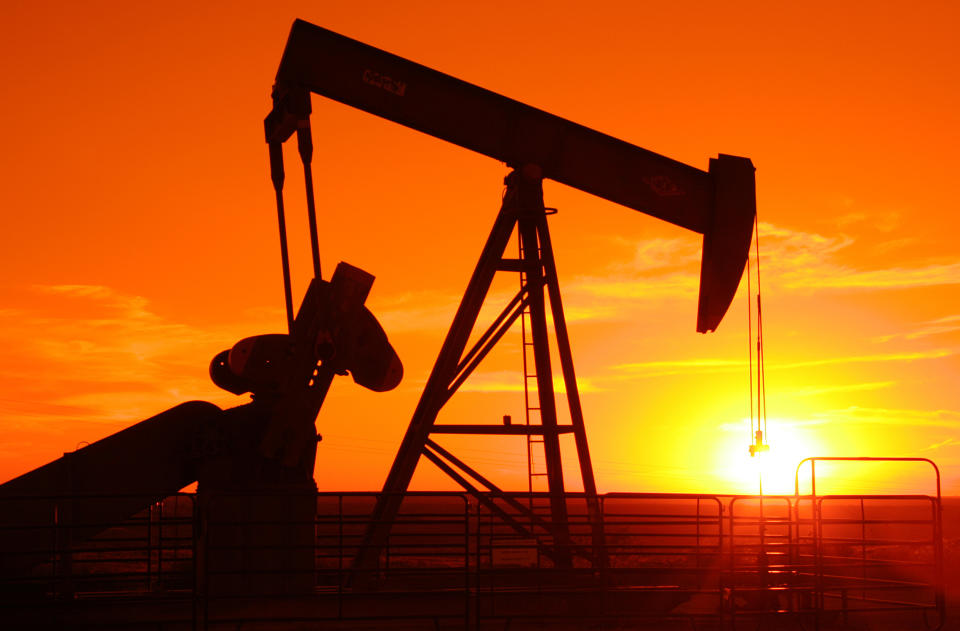Thinking of Buying Chesapeake Energy Stock? Here's What You Need to Know
Shares of Chesapeake Energy (NYSE: CHK) have bounced around quite a bit over the past year. The oil and gas stock was up about 35% at one point last year before it crashed with oil prices, finishing down 47%. Chesapeake has experienced similar volatility this year. Shares rocketed more than 50%, before giving back those gains, and then some, after crude entered its second bear market in a year.
Volatility, however, is only part of the story at Chesapeake Energy. Here are three other important things investors need to know if they're thinking about buying its stock.

Image source: Getty Images.
1. It's shifting its focus from gas to oil
Chesapeake Energy was once one of the largest natural gas producers in the country. However, it has slipped from the second-largest gas producer in 2015 down to the sixth largest as of this year's first quarter. That slide down the leaderboard is the result of asset sales and a shift toward drilling oil wells.
The company made its biggest pivot away from natural gas last year when it sold its position in the Utica shale and then made the surprising acquisition of oil-focused WildHorse Resource Development. That deal will accelerate the company's shift toward oil. Chesapeake anticipates that its oil production will grow by 32% this year. As a result, crude will rise from 19% of its total output last year up to 30% by 2020. Overall, the company expects to allocate 80% of its annual capital spending on drilling oil wells. Thus, Chesapeake is becoming an oil growth stock, which is quite different from the gas-fueled growth it had delivered in the past.
2. It's still outspending cash flow
One thing that hasn't changed about Chesapeake Energy is its aggressive approach toward investing in expanding its output. The company has routinely outspent its cash flow on drilling new wells, which continues to be the case.
However, the company has narrowed its outspending considerably over the years and expects only a small gap this year. Its goal is to eventually generate free cash flow, which will give it more funds to pay down debt.
While Chesapeake Energy aims to produce positive free cash flow in the future, most of its peers are already generating boatloads of excess cash that they're sending back to shareholders via rising dividends and meaningful share-repurchase programs. Since Chesapeake isn't yet producing excess cash and still has a weak balance sheet, it will likely be quite some time before the company starts returning money to shareholders.
3. Its balance sheet remains a work in progress
Chesapeake Energy's years of aggressive growth have weighed on the company's balance sheet since it had to take on lots of debt to fund its expansion. The company ended the last quarter with about $10 billion of debt on its balance sheet. Because of that, it has an elevated leverage ratio of 4 times debt to EBITDA.
The company set a target to get that ratio down to 2 in the coming years. Its oil-focused growth plan should push that metric to 3.6 times this year and 2.8 times by the end of 2020. While that would be a notable improvement, it's still a long way from Chesapeake's target level and even farther from the comfort zone of most peers, which are aiming for leverage ratios in the 1 to 1.5 range.
Chesapeake Energy is a high-risk oil growth stock
Investors who are considering Chesapeake Energy's stock need to know that it's not the same company it once was. The driller is pivoting away from gas toward oil, which should boost its margins. That oil-fueled growth should expand the company's cash flow and earnings, thus improving its financial profile. In the meantime, however, the company is still a risky bet since it's well behind its peers. Shares could remain excruciatingly volatile, which is why investors should think twice before buying this oil stock.
More From The Motley Fool
Matthew DiLallo has no position in any of the stocks mentioned. The Motley Fool has no position in any of the stocks mentioned. The Motley Fool has a disclosure policy.

 Yahoo Finance
Yahoo Finance 